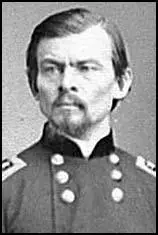Franz Sigel

Franz Sigel was born in Baden, Germany, on 18th November, 1824. A graduate of the German Military Academy, he resigned from the German Army in 1847 and became involved in radical politics. Sigel took part in the 1848 German Revolution and was afterwards forced to flee to Switzerland.
Sigel lived in England for a while until emigrating to the United States. He taught in New York City schools before becoming the director of education in St. Louis.
An opponent of slavery, he immediately joined the Union Army on the outbreak of the American Civil War. He was commissioned Colonel of the 3rd Missouri but within a few weeks had been promoted to the rank of Brigadier General.
Sigel commanded the 4th Brigade of Army of Southwest Missouri from January to February of 1862. He took part in the battles at Wilson's Creek. and Pea Ridge before being appointed Major General on 21st March, 1862. Three months later he fought against Thomas Stonewall Jackson in Shenandoah Valley (4th to 26th June) and against Robert E. Lee at the 2nd Battle of Bull Run.
In the winter of 1863 bad health forced Sigel to rest from active duty. He returned in March, 1864, but was badly defeated at New Market. In July he fought Major General Jubal Early at Harpers Ferry but soon afterwards was relieved of his command for "lack of aggression".
After the war Sigel went to live in Baltimore where he worked as a journalist. He later moved to New York City where he became involved in publishing and lecturing. Franz Sigel died in New York on 21st August, 1902.
Primary Sources
(1) Carl Schurz, Autobiography of Carl Schurz (1906)
Abraham Lincoln appointed General Franz Sigel as the commander of the First Army Corps of the Army of Virginia. The German-American troops welcomed Sigel with great enthusiasm, which the rank and file of the native American regiments at least seemed to share. He brought a splendid military reputation with him. He had bravely fought for liberty in Germany, and conducted there the last operations of the revolutionary army in 1849. He had been one of the foremost to organize and lead that force of armed men, mostly Germans, that seemed suddenly to spring out of the pavements of St. Louis, and whose prompt action saved that city and the State of Missouri to the Union. On various fields, especially at Pea Ridge, he had distinguished himself by personal gallantry as well as by skillful leadership.

